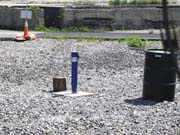U.S. District Jude Dennis Cavanaugh last week ordered technology manufacturer Honeywell to remove all chromium-contaminated soil from property on Route 440.
The 32-acre piece of property, located on the banks of the Hackensack River in Jersey City, was the site of the now defunct Mutual Chemical Company, according to Steven German. German is the legal representative for the environmental group Hackensack Riverkeeper and the Interfaith Council, a collection of Jersey City-based religious groups.
Honeywell purchased the property in the 1950s.
The two organizations filed suit against Honeywell to have contamination removed from the Route 440 property in the late 1980s, according to German.
"A judge later consolidated the two suits," German added.
German said the Third District Court in Philadelphia ruled that Honeywell had to remove the contaminated soil and any contaminated sediment in the Hackensack River.
"In addition," he said, "Honeywell has been ordered to install hydrological controls to keep contaminated sediment from other locations from reaching the Honeywell site once it has been cleaned."
Bill Sheehan, director of the Hackensack Riverkeeper, a nonprofit group, added that Cavanaugh ruled that Honeywell would have to fill the site with clean fill after it has removed the chromium-tainted material.
First discovered by French scientist Louis Vauquelin in 1797, the comparatively rare heavy metal is mixed with other chemicals to produce dyes and paints. Chromium is also mixed with metals like copper in the production of stainless steel, because chromium does not rust in open air.
However, chromium is toxic and its presence in soil is considered a health hazard.
Mike Holland, spokesperson for Honeywell, said on Wednesday that his firm was going to appeal the judge’s ruling.
"Right now, all I’m going to say is that Honeywell will be looking to appeal the court’s decision," Holland stated in a phone interview.
German said on Thursday that former New Jersey Sen. Robert Torricelli had been named by the Third District Court as the overseer on the Route 440 site cleanup. German was unable to say any more on the matter, but sources close to Torricelli said he had been offered the position. Torricelli would not make a statement on the matter until he received official word of the court appointment, the source stated.
Torricelli resigned from the Senate in October of 2002 after an ethics scandal, but had had an active environmental record while serving in the Senate, backing efforts to clean up toxic waste sites in Bergen County and supporting the government’s environmental cleanup Superfund.
According to German, Mutual Chemical operated a factory on what is now the site of the Home Depot on Route 440.
"Mutual Chemical existed from about 1895 until 1954," said German, a member of the law firm of Terris, Pravlik & Millian located in Washington, D.C. German said his firm specializes in such public interest cases as contamination clean-up sites.
"In the 1950s, Honeywell purchased Mutual Chemical, acquiring its contamination problems along with the company," German stated. "Over the years that Mutual existed, they dumped contaminated sediment in the Hackensack River, creating the field that is directly opposite the Home Depot."
German added the Environmental Protection Agency began efforts to get Honeywell to clean up the Route 440 location as early as 1982.
"The EPA said Honeywell had to create a plan for the clean up of the area," German said. "There were a lot of studies and no action."
German said Honeywell indulged in "regulatory ping-pong," stalling cleanup efforts with the studies it produced.
"The ruling will show that citizens can do something about pollution in their neighborhoods," said German.
Can’t just cover it up
Sheehan saw another significant point in the judge’s ruling ordering the cleanup of the former Mutual Chemical property. "This ruling is significant because it is in accord with the environmental community’s belief that capping won’t work," said Sheehan. "By ordering them [Honeywell] to clean up, the judge addressed the belief that capping does not work."
The process of "capping" or covering contaminated areas with asphalt is a common practice in dealing with areas that are not badly contaminated. Sheehan said capping would not have been a solution at the Route 440 site because chromium has spread into the river itself, infecting the animal life in the waterway.
"There is chromium in the crabs in the Hackensack River," said Sheehan.
Mike Reid, a worker at a trucking firm next to the Honeywell property, expressed his surprise when he was told about the contamination.
"So that’s what those guys were doing out there," Reid said. According to Reid, last year he saw men drilling holes in the ground on the property and removing soil. "They also set up testing wells all over the field," he said.
Reid was unaware the soil was contaminated and commented sardonically on the news. "I’m sure glad they told us about it," said Reid.
Sheehan said the ruling was a significant victory for his organization and other groups like it. "This is a big win for a small, non-profit group like the Riverkeeper," Sheehan stated. "It makes me look around to find out where we might strike next."
